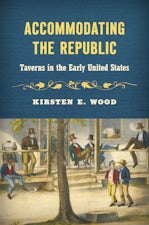The Elusive Republic
Political Economy in Jeffersonian America
By Drew R. McCoy
278 pp., 6 x 9, notes, index
-
Paperback ISBN: 978-0-8078-4616-2
Published: September 1996 -
E-book EPUB ISBN: 978-0-8078-3832-7
Published: December 2012 -
E-book PDF ISBN: 979-8-8908-6618-9
Published: December 2012
Published by the Omohundro Institute of Early American History and Culture and the University of North Carolina Press
Buy this Book
- Paperback $37.50
- E-Book $25.99
Published by the Omohundro Institute of Early American History and Culture and the University of North Carolina Press
About the Author
Drew R. McCoy, Jacob and Frances Hiatt Professor of History at Clark University, is author of The Last of the Fathers: James Madison and the Republican Legacy.
For more information about Drew R. McCoy, visit
the
Author
Page.
Reviews
"McCoy has both enlarged our understanding of early American history and given us a perspective from which to see the deficiencies of the republic today."--Virginia Quarterly Review
"This superbly crafted book is both a literary treat and necessary reading for anyone who wants to understand America's Revolutionary era. . . . Filled with insights that a summary cannot begin to mention and argued with uncommon force, economy, and grace, this volume adds a new dimension to the evolving reinterpretation of the revolutionary vision of the 1770s."--Journal of American History
"An imaginative and well-written book that will be necessary reading for all American historians concerned with the post-Revolutionary period."--Journal of Economic History
"McCoy's study of the contradictions and ambivalence of republican economic thought makes an important contribution to our understanding the Revolutionary era. But its significance is much wider, for The Elusive Republic offers insights into the complex relationships between ideology and social change, between tradition and modernity."--Virginia Magazine of History and Biography




